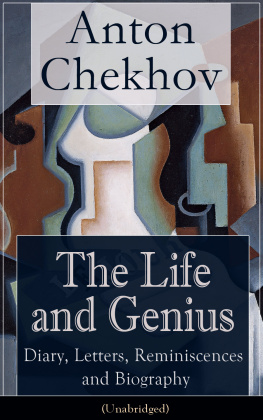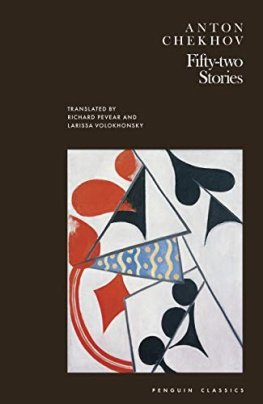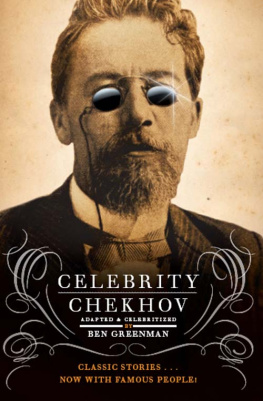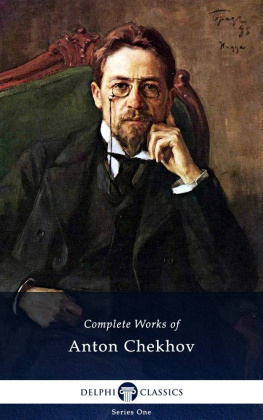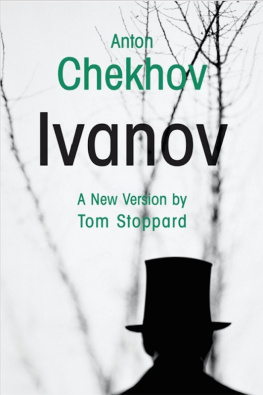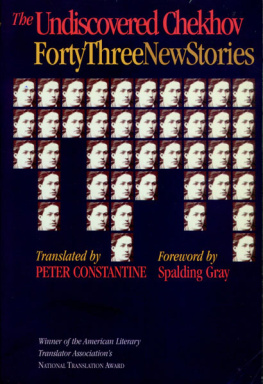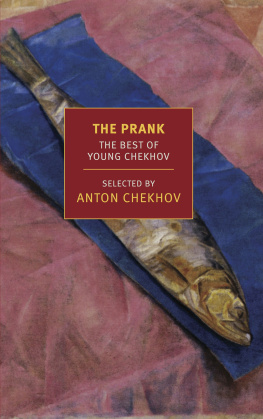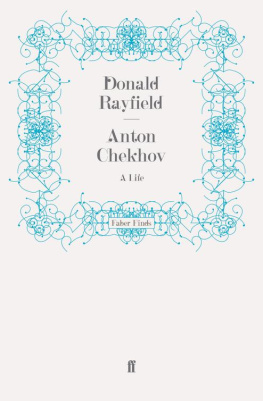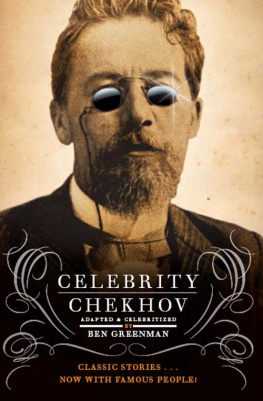CHEKHOV
The Hidden Ground
ALSO BY PHILIP CALLOW
BIOGRAPHY
Son and Lover: The Young D. H. Lawrence
Vincent Van Gogh: A Life
From Noon to Starry Night: A Life of Walt Whitman
Lost Earth: A Life of Czanne
AUTOBIOGRAPHY
In My Own Land
NOVELS
The Hosanna Man
Common People
A Pledge for the Earth
Clipped Wings
Going to the Moon
The Bliss Body
Flesh of Morning
Yours
The Story of My Desire
Janine
The Subway to New York
The Painters Confessions
Some Love
The Magnolia
SHORT STORIES
Native Ground
Woman with a Poet
POETRY
Turning Point
The Real Life
Bare Wires
Cave Light
New York Insomnia
Icons
Soliloquies of an Eye
Notes Over a Chasm
Fires in October
Nightshade and Morning Glory
CHEKHOV
The Hidden Ground

A BIOGRAPHY BY
Philip Callow

CHEKHOV: THE HIDDEN GROUND. Copyright 1998 by Philip Callow. All rights reserved, including the right to reproduce this book or portions thereof in any form. For information, address: Ivan R. Dee, Publisher, 1332 North Halsted Street, Chicago 60622. Manufactured in the United States of America and printed on acid-free paper.
Photographs: SCR Photo Library, London
Library of Congress Cataloging-in-Publication Data:
Callow, Philip.
Chekhov, the hidden ground : a biography / by Philip Callow.
p. cm.
Includes bibliographical references and index.
ISBN: 978-1-56663-187-7
1. Chekhov, Anton Pavlovich, 18601904Biography. 2. Authors,
Russian19th centuryBiography. 1. Title.
PG3458.C35 1998
891.723dc21 97-46679
In Siberia not only bears roar,
but sparrows and mice as well.
The cat got it, and its roaring,
they say of a mouse.
Chekhov, Across Siberia
The weather here is magnificent and warm,
but thats only gravy....
Chekhov, in a letter
I FIRST CAME ACROSS the work of Chekhov quite by accident, and in complete ignorance. The occasion was a performance of The Seagull by an amateur company, the Wheatsheaf Players, at Coventry Technical College theatre, a college I had attended as a boy until Christmas 1939.
I must have been twenty-two. The war had not long been over. For an amateur group to tackle The Seagull was, I now realize, remarkable: at any rate wildly ambitious.
The plays ironies and eccentricity were lost on me, as were its allusions to Ibsen, Maupassant, Maeterlinck, and Hamlet. The ridiculous play-within-a-play at its heart I thought beautiful. For the first time I was conscious of experiencing a work of art, a poem, that went on blossoming and seemed to exist in its own right, with no visible author.
It flowered astonishingly and hung there, shaken by un-English tears, perverse laughter, a pistol shot, and by something beyond the words and action, moving softly and mysteriously. A presence. A spirit thing.
I had no idea that my journey through the world of Chekhov had begun. This book is dedicated to the memory of that production.
Contents
Foreword
AS A YOUNG MAN I was overwhelmed by the masterpieces of Tolstoy and Dostoevsky, those Russian giants, and then by the great autobiographies of Gorky. Chekhov, while delightful, swift, and caustic, seemed of a lesser order of genius. How wrong I was.
For anyone who writes a literary biography, the authors work is soon inseparable from the life. The evolution of his art goes hand in hand with the development of his character, and his shaping factors, his frustrations, fears, and ambivalences, enter into the work at every point. Bearing this in mind, but not only for this reason, I have examined Chekhovs stories and plays in some detail. Any new insights come as much from his work as from anything else. Nevertheless, this book is a biography first and foremost, not a work of literary criticism.
Like Leskov, only more so, Chekhov is the Russian outsider, far removed in his origins from the landowner writers before him. It is no accident that his closest friend for much of his life was the publisher Suvorin, a peasants son who established Russias most popular conservative newspaper and in the process made himself a millionaire. We have to remind ourselves constantly that Chekhov was for years a doctor first and a writer second, seeing writing as a frivolous, irrelevant activity. He exhausted himself with this double life and was soon in bad health, and the exhortations of characters in his plays (We must work, work, work) were aimed at himself.
As I absorbed myself more deeply in the Chekhov story I was soon puzzled by the curious remoteness that characterized virtually all his relationships. Two of his recurrent themes are romantic disillusionment and the search for intimacy, which is nearly always frustrated. How much light does this throw on his dealings with women? The love theme, central to his biography and his art, has so far been insufficiently explored by Chekhov scholars. Here is a man whose art is profoundly convincing and humane, yet in his own life he held back coldly and perhaps fearfully from any real commitment.
Chekhov is astonishingly modern: the new kind of man, uncomfortable in the world and refusing to sentimentalize his unease. It is no good expecting him to speak for a class, and certainly not for Russia. Tolstoy with his moral authority, his grandeur, and his monomania is the last writeruntil Solzhenitsynto assume a national voice. It would be absurd to speak of Chekhov as we speak of Tolstoy. An enemy of abstraction, he cannot be pinned down to any clearly defined philosophy of life. His characters all tell us in different ways that to be human is to be condemned to muddle and confusion. Again and again they find it impossible to formulate anything consistently. Things are against them. His irony, which makes him so attractive to the English, is as modern as Hemingways, as Becketts. In his personal life he is as understated as in his work. He likes women but doesnt want to love them. Perhaps he doesnt want to love anybody. Why should he pretend? For all his family loyalties, he stands apartat a slight angle to the universe, as Forster said of the Greek poet Cavafy. In different circumstances one can imagine him as a sort of refined nomad, moving on because there is always something wrong with where he is.
A great virtue in Chekhovperhaps his greatestis his refusal to falsify his work. He drew back in a kind of revulsion from the acting up of Dostoevsky, and rejected what he saw as Tolstoys fallacious reverence for the peasants. All the same he loved Tolstoy for his moral stature, admired his almost animal eye, and thought him huge, a god. And even Chekhov succumbed now and then to the Russian temptation to be dual, to have it both ways, as D. H. Lawrence would say.
He began as a comic writer of facetious squibs, and was cracking jokes even on his deathbed. His sweetness and charm melted feminine hearts, and the sharp-eyed Tolstoy spotted the woman under the skin. He was tough-minded, unsentimental, with a hatred of compromise, and yet for all his candor his sexual nature somehow eludes us. Here is the nub of that mystery which gives every appearance of being an open secret. He is a modest genius who finds the whole notion of fame unseemly and beside the point; a man furious at injustice who is apolitical; a humorist in despair before the mediocrity, stupidity, and cruelty of the world; a generous spirit unable to stop working for others, incapable of turning anyone away, who remains stubbornly apart and hidden.
Next page

